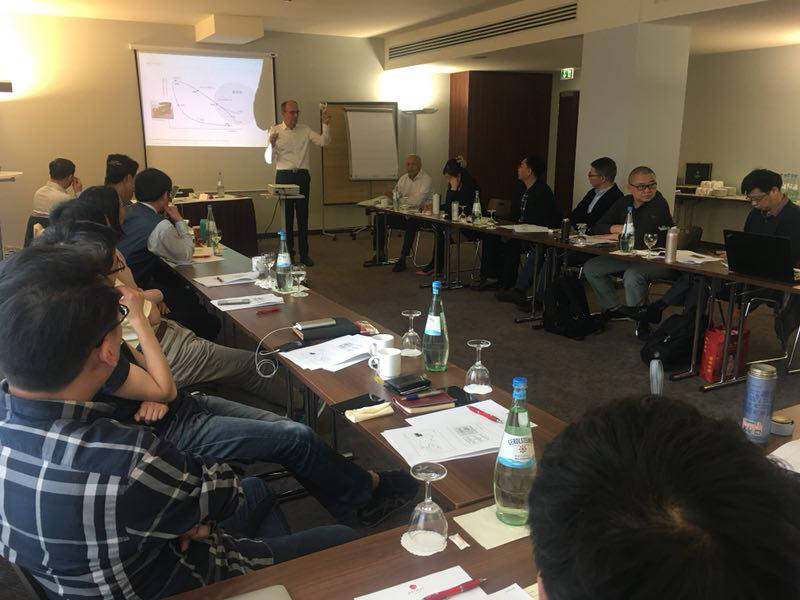| Position: Home > News Center > Company News |
| JAISTC Organized a Delegation to Participate in the Hanover Industrial Fair (April 2018) |
| Publish Time:2023-08-01 |
|
In April 2018, under the leadership of the association's president, Cao Sumin, a delegation of intelligent manufacturing company executives from our province participated in the Hanover Industrial Fair in Germany and visited relevant smart manufacturing companies in Germany. All members were satisfied with the arrangements of the event, gained a certain understanding of the current global trends in intelligent manufacturing, were deeply impressed by Germany's modern industrialization and "craftsman spirit," and felt confident and hopeful about strengthening international cooperation and moving towards globalization in the future. 1.Visiting the 2018 Hanover Industrial Fair: The 2018 Hanover Industrial Fair included five main themes: Industrial Subcontracting and Parts, Integrated Automation and Power Transmission, Digital Factory, Energy, and Research & Technology. As most members of the delegation came from intelligent manufacturing companies, the focus of attention was on areas such as automation, power transmission, and digital industry.
2. Attending Expert Lectures: The delegation was honored to receive a lecture from Mr. Wolfgang Dorst, the former head of the German Association for Information Technology, Telecommunications, and New Media, who was also involved in drafting the German Industry 4.0 report.
Mr. Wolfgang Dorst gave a lecture 3. Visiting Benchmark Enterprises: The delegation visited several companies to learn from their best practices: 3.1 Deytz Corporation: The world's leading and oldest engine manufacturer, offering a wide range of water-cooled and air-cooled engines with power ranging from 25 kW to 520 kW, widely used in various fields such as construction machinery, power generators, agricultural machinery, commercial vehicles, railway locomotives, ships, and military vehicles, as well as various other specialized applications. 3.2 Kärcher Group: A typical German "hidden champion" enterprise, a renowned international manufacturer of high-pressure cleaning machines founded by Mr. Kärcher in 1935. The group has ten production facilities worldwide, producing various types of products daily with organic coordination and integration. 3.3 OWL Intelligent Factory: A smart factory jointly built by the Fraunhofer Institute for Photonic Microsystems Technology and the OWL University of Applied Sciences as a leading laboratory for German information and communication technology automation. 3.4 Bosch Rexroth AG: A company located in Roer, producing servo motors, is a world-renowned enterprise in hydraulic, pneumatic products, and control technology, with business operations in over 80 countries and more than 37,000 employees. Its sales revenue in 2012 reached 6.5 billion euros. 4.Main gins: 4.1 Industry 4.0 was initiated by German companies and later recognized as a national strategy by the government. Companies tend to be low-key, focusing on technology upgrades tailored to their specific needs. The goal is not merely to replace humans with machines but to achieve practical effects, such as improving production efficiency, enhancing product quality, and reducing production costs. 4.2 The Internet of Things, cloud computing, and big data applications are becoming increasingly prevalent. Besides Integrated Automation and Power Transmission and the Digital Factory, other exhibitions like Energy, Industrial Subcontracting and Parts were also related to these technologies. Even in the case of parts, many are made intelligent through embedded chips, while the majority are manufactured using intelligent processes. The trend of interconnecting everything in the industrial field is on the rise. 4.3 The German government promotes Industry 4.0 mainly by creating a fair and just legal environment rather than providing substantial financial support. 4.4 "Hidden champions" are widely recognized as essential support for the long-term competitiveness of German manufacturing. However, many small and medium-sized enterprises in Germany still have doubts or a wait-and-see attitude towards Industry 4.0, especially regarding the high initial investment and uncertain economic returns. In response, the German government vigorously supports the participation of small and medium-sized enterprises in Industry 4.0 and provides public services for them, including guaranteeing their participation, offering information, testing, and funding support, and using application examples to address their concerns. 4.5 Jiangsu's manufacturing innovation still has some gap to reach world-leading levels. Among the 5000+ exhibiting companies at the Hanover Industrial Fair, there were many from Jiangsu. However, most of them concentrated in lower value-added fields such as machinery manufacturing and casting, and their booths were located on the outskirts of the various halls, attracting little attention. In contrast, some well-known companies from other provinces, like Huawei, Haier, and BYD, were competing on an equal footing with global leading companies in key exhibition areas. Our province should further strengthen research and development in future manufacturing technologies and systems, focusing on intelligent, networked, and service-oriented development, and accelerate innovation in industrial network communication, sensing systems, industrial computing, control systems, and other areas. 4.6 Most companies that meet the requirements of German Industry 4.0 have gradually evolved their existing factory production lines rather than building entirely new factories according to Industry 4.0 standards, as the cost of a new factory is very high. For example, it took Bosch Rexroth AG five years to raise the proportion of its "Industry 4.0 production lines" to about 25% of all production lines, and this proportion is expected to gradually increase to around 40% in the next three years. |

